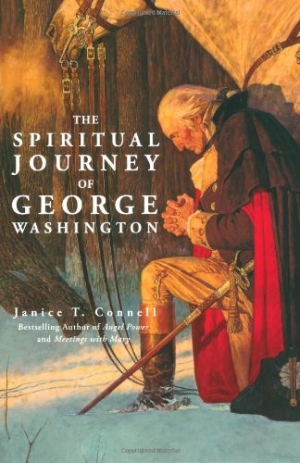The Spiritual Journey of George Washington
Connell’s extensive research on George Washington gives depth to his legacy with a thorough analysis of his spiritual life.
Almost every aspect of George Washington’s life has been extensively researched and documented, providing a seemingly complete picture with few areas open to further elaboration. But Janice T. Connell ventures into the rarely examined foundation that supported Washington’s existence—his personal faith and beliefs. This vital dimension of the first president’s innermost being weaves through every phase of his life and gives depth to his inspiring words and deeds.
Connell cites extensive references to support her points, using quotations, statistics, historical facts, and—most revealing and enlightening—many of Washington’s own prayers, writings, and musings. Rather than making assumptions about her subject’s thoughts and attitudes on a given topic, Connell lets Washington’s personal journals and public speeches convey his deepest emotions and feelings; doing so lends considerable credibility to the volume.
Although the book presents a plethora of factual information, at times she sacrifices the flow of the story for the sake of detail. For example, chapter two focuses on Washington’s steadfast commitment to The Rules of Civility and Decent Behavior in Company and Conversation, a compilation of 110 rules that a young, dignified gentleman should observe. Citing a few examples, such as, “When seated, place your feet firmly on the ground, with the legs at an equal distance, and neither a leg nor a foot should be crossed one upon the other,” would adequately give a flavor of ideals it contains, yet the list of all 110 rules takes up more than ten pages, disrupting the narrative. Placing them as an appendix would have provided the information without slowing down Washington’s compelling story.
Connell’s easygoing writing style makes the narrative appealing, and her passion for her subject permeates the book. The beautiful, full-color cover image of Washington kneeling in prayer sets the spiritual tone before the first page is even read, and Connell includes just enough theological explanation and insight to keep the theme prominent in each chapter.
There are times, however, when Connell slips from the role of passionate biographer and into that of personal publicist. For example, she writes: “Though Washington was a man who cherished above all else the peace and comfort of home and family, effort, prayer, sacrifice and circumstances raised him up to be successful surveyor, innovative farmer, self taught scholar, prolific writer, loving family man, esteemed leader, victorious warrior, prescient administrator, brilliant diplomat and master of hospitality.” The book also skips past quotations that mention Washington’s fury, “which few wished to incite,” and his occasional displays of being stern, hot-tempered, and unforgiving. Addressing how he dealt with some of these less-favorable traits from the perspective of his faith would offer a more balanced account.
Connell crafts an interesting and informative story line that succeeds in blending appropriate amounts of historical fact with an abundance of revealing character glimpses that reinforce the importance of Washington’s Anglican/Episcopal faith. Tighter editing would have removed grammatical errors (especially those involving commas and semicolons) and several overused adjectives and phrases (such as “young,” “youthful,” “first president,” and “Founding Father”), but these do not detract from the overall solid work.
Connell tackles a challenging topic and delivers a satisfying and enlightening portrait of a true American hero.
Reviewed by
Jeff Friend
Disclosure: This article is not an endorsement, but a review. The publisher of this book provided free copies of the book and paid a small fee to have their book reviewed by a professional reviewer. Foreword Reviews and Clarion Reviews make no guarantee that the publisher will receive a positive review. Foreword Magazine, Inc. is disclosing this in accordance with the Federal Trade Commission’s 16 CFR, Part 255.

